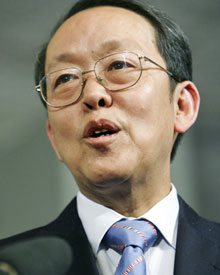|
China committed to peaceful development
(Xinhua)
Updated: 2006-04-30 13:31
CHICAGO -- China is committed to peaceful development and will not attempt to
alter the existing international configuration -- a mistake many rising powers
made in the past, Chinese Ambassador to the United Nations Wang Guangya said
here Saturday.

Chinese Ambassador to
the United Nations, Wang Guangya speaks to the media at the United
Nations Headquarters in New York in this April 27, 2006 photo.
[Reuters] | Addressing a symposium organized by the University of
Chicago, Wang said there exists a kind of misgivings and anxiety in the United
States about the possibility of China repeating the past mistake of large powers
on the rise.
Noting that historically these powers attempted to
influence and alter the existing international configuration of their times,
Wang made it clear that China "needs and is committed to development predicated
on domestic harmony and external peace" and its foreign policy therefore "has to
be oriented toward the pursuit of peace, the maintenance of stability and the
promotion of cooperation."
He said that peaceful development is nothing
less than a prerequisite for China's endeavor to become prosperous, and is the
best embodiment of the trend of today's world.
"For a developing country
with a population of 1.3 billion like China, it will take decades, perhaps a
century, of sustained efforts before a decent, comfortable life could be ensured
for all its citizens," he said. "This is exactly all the more reason for China
to live in harmony with other countries and to promote prosperity for all
societies."
Historically, he went on to say, the rise of a new power was
often accompanied by clashes and upheavals in the international system and
configuration, more often than not leading to bloody, armed conflict.
Noting that rapid economic globalization and political multipolarization
have increased the interdependence of countries to an unprecedented degree in
the 21st century, Wang emphasized that in this new era, "peace will make winners
of us all and conflicts will make all of us losers."
"The traditional
pattern of clashes triggered by the rise of a large power is bound to give way
to peaceful coexistence. In its push for development, China will not and cannot
retread that 'zero-sum' path traditionally taken by powers on the rise. Our only
option is peaceful development in which all countries are winners."
Wang
admitted that China's sustained high rate of growth has provoked widespread
concern in the international community. "It is precisely this high rate of
growth that has prompted some to argue that China has caused repercussions on
other economies and a steep increase in demand for energy and other resources,
thereby objectively impacting the world economy," he said.
Citing the
locomotive effect of China on the world economy and the country's honoring of
its commitments to the World Trade Organization, Wang dismissed the concern. "I
submit that no matter which way you look at it, China's development is no
challenge or threat to any nation but rather represents a tremendous
contribution and opportunity," he stressed.
"China is developing as an
integral part of the world, and the rapid growth of the Chinese economy can only
bring exciting opportunities and ever expanding cooperation to the world," he
added.
Wang also expressed the belief that China and the United States
can be partners of cooperation rather than rivals in competition.
"I
firmly believe that common interests between the two countries are primary both
in the short and the long run. There is absolutely nothing that prevents the
U.S. and China from forging a mutually beneficial partnership," he said.
"As the largest developing country and the largest developed country
respectively, China and the United States have a special responsibility for
peace, security and prosperity in the world, especially in the Asia and Pacific
region," he said. "China believes that our two countries are fully capable of
strengthening our cooperation to our mutual benefit."
|
| |
|
| |
|